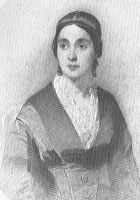First Love Poem by Caroline Elizabeth Sarah Norton
First Love
YES, I know that you once were my lover,
But that sort of thing has an end,
And though love and its transports are over,
You know you can still be--my friend:
I was young, too, and foolish, remember;
(Did you ever hear John Hardy sing?)
It was then, the fifteenth of November,
And this is the end of the spring!
You complain that you are not well-treated
By my suddenly altering so;
Can I help it?--you're very conceited,
If you think yourself equal to Joe.
Don't kneel at my feet, I implore you;
Don't write on the drawings you bring;
Don't ask me to say, 'I adore you,'
For, indeed, it is now no such thing.
I confess, when at Bognor we parted,
I swore that I worshipped you then--
That I was a maid broken-hearted,
And you the most charming of men.
I confess, when I read your first letter,
I blotted your name with a tear--
But, oh! I was young--knew no better,
Could I tell that I'd meet Hardy here?
How dull you are grown! how you worry,
Repeating my vows to be true--
If I said so, I told you a story,
For I love Hardy better than you!
Yes! my fond heart has fixed on another,
(I sigh so whenever he's gone,)
I shall always love you--as a brother,
But my heart is John Hardy's alone.
This is one of the funniest poems I have ever read. Beautiful in a very refreshingly amusing way.
The realization that her so called first love was mere infatuation and her love was some one else who mat later, beautifully described.
I like this poem she is telling her old lover yeah i loved you once but I've moved on so beat it. You had my heart but now it is gone and I love someone new.
LATER I will response on this Love Poem, but first of all about the poetess behind this poem
Despite the era, the poetess dares to write about the love she has no more for the person, she dares to mention the name of her new lover, that is not normal for this era where she lived in
SEVEN: Caroline Norton's efforts formed the basis of what Barbara Leigh Smith Bodichon campaigned for successfully years later.
SIX: while the Custody of Children Act granted mothers limited custodial rights over minor children
FIVE: The Matrimonial Causes Act allowed married women to inherit property and take court action on their own behalf,
FOUR: Primarily because of Caroline's intense campaigning, Parliament passed the Custody of Infants Act 1839 and the Matrimonial Causes Act 1857.
This poem has not been translated into any other language yet.
I would like to translate this poem
Wow! I guess she put him in his place! She uses John Hardy in the last line. Earlier she said ... If you think yourself equal to Joe. So I was thinking Joe Hardy (and his brother Frank) . I'm probably the only one here old enough to remember the old Hardy Boys mystery books.